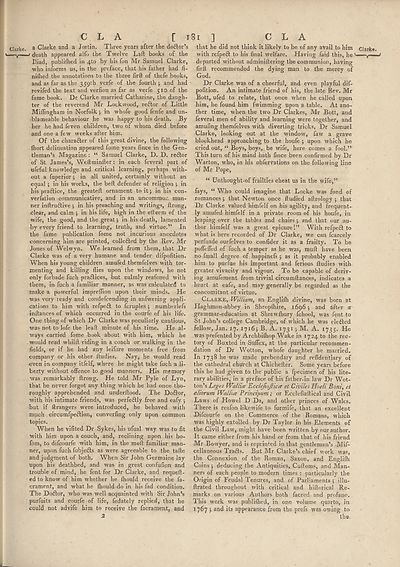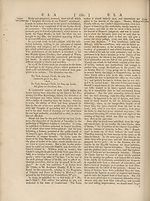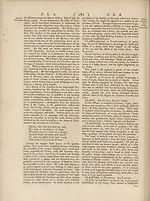Encyclopaedia Britannica, or, a Dictionary of arts, sciences, and miscellaneous literature : enlarged and improved. Illustrated with nearly six hundred engravings > Volume 6, CHI-Crystallization
(191) Page 181
Download files
Complete book:
Individual page:
Thumbnail gallery: Grid view | List view

€ L A [i
a Clarke and a Jortin. Three years after the do£tor’s
death appeared alfu the Twelve Laft books of the
Iliad, publifhed in 410 by his fon Mr Samuel Clarke,
who informs us, in the preface, that his father had fi-
nifhed the annotations to the three firft of thefe books,
and as far as the 359th verfe of the fourth 5 and had
revifed the text and verfion as far as verfe 510 of the
fame book. Dr Clarke married Catharine, the daugh¬
ter of the reverend Mr Lockwood, reftor of Little
Miflingham in Norfolk ; in whofe good fenfe and un-
blameable behaviour he was happy to his death. By
her he had feven children, two of whom died before
and one a few weeks after him.
Of the chara&er of this great divine, the following
fhort delineation appeared fome years fince in the Gen¬
tleman’s Magazine : “ Samuel Clarke, D. D. redtor
of St James’s, Weftminfter: in each feveral part of
ufeful knowledge and critical learning, perhaps with¬
out a fuperior; in all united, certainly without an
equal ; in his works, the belt defender of religion ; in
his practice, the greateft ornament to it; in his con-
verfation communicative, and in an uncommon man¬
ner inftru&ive •, in his preaching and writings, ftrong,
clear, and calm ; in his life, high in the etleem of the
wife, the good, and the great; in his death, lamented
by every friend to learning, truth, and virtue.” In
the fame publication fome not incurious anecdotes
concerning him are printed, collefted by the Rev. Mr
Jones of Welwyn. We learned from them, that Dr
Clarke was of a very humane and tender difpofition.
When his young children amufed themfelves with tor¬
menting and killing flies upon the windows, he not
only forbade fuch praftices, but calmly reafoned with
them, in fuch a familiar manner, as was calculated to
make a powerful impreflion upon their minds. He
was very ready and condefcending in anfwering appli¬
cations to him with refpefl to fcruples ; numberlefs
inflances of which occurred in the courfe of his life.
One thing of which Dr Clarke was peculiarly cautious,
was not to lofe the lead minute of his time. He al¬
ways carried fome book about with him, which he
would read whilft riding in a coach or walking in the
fields, or if he had any leifure moments free from
company or his other ftudies. Nay, he would read
even in company itfelf, where he might take fuch a li¬
berty without offence to good manners. His memory
was remarkably ftrong. He told Mr Pyle of Lyn,
that he never forgot any thing which he had once tho¬
roughly apprehended and underftood. The Doftor,
with his intimate friends, was perfefHy free and eafy •,
but if ftrangers were introduced, he behaved with
much circumfpedion, converfing only upon common
topics.
When he vifited Dr Sykes, his ufual way was to fit
with him upon a couch, and, reclining upon his bo-
fom, to difcourfe with him, in the moft familiar man¬
ner, upon fuch fubjefts as were agreeable to the tafte
and judgment of both. When Sir John Germaine lay
upon his deathbed, and was in great confufion and
trouble of mind, he fent for Dr Clarke, and requeft-
ed to know of him whether he fhould receive the fa-
crament, and what he ftiould do in his fad condition.
The Dodlor, who was well acquainted with Sir John’s
purfuits and courfe of life, fedately replied, that he
could not advife him to receive the facrament, and
2
81 ] C L A
that he did not think it likely to be of any avail to him Clarke,
with refpeift to his final welfare. Having faid this, he 1 ■■ ■ y—»
departed without adminiftering the communion, having
firft recommended the dying man to the mercy of
God.
Dr Clarke was of a cheerful, and even playful dif¬
pofition. An intimate friend of his, the late Rev. Mr
Bott, ufed to relate, that once when he called upon
him, he found him fwimming upon a table. At ano¬
ther time, when the two Dr Clarkes, Mr Bott, and
feveral men of ability and learning were together, and
amufing themfelves with diverting tricks, Dr Samuel
Clarke, looking out at the window, faw a grave
blockhead approaching to the houfe ; upon which he
cried out, “ Boys, boys, be wife, here comes a fool.”
This turn of his mind hath fince been confirmed by Dr
Warton, who, in his obfervations on the following line
of Mr Pope,
“ Unthought-of frailties cheat us in the wife,”
fays, “ Who could imagine that Locke was fond of
romances ; that Newton once ftudied aftrology ; that
Dr Clarke valued himfelf on his agility, and frequent¬
ly amufed himfelf in a private room of his houfe, in
leaping over the tables and chairs ; and that our au¬
thor himfelf was a great epicure!” With refpefl to
what is here recorded of Dr Clarke, we can fcarcely
perfuade ourfelves to confider it as a frailty. To be
po fie fled of fuch a temper as he was, muft have been
no fmall degree of bappinefs ; as it probably enabled
him to purfue his important and ferious ftudies with
greater vivacity and vigour. To be capable of deriv¬
ing amufement from trivial circumftances, indicates a
heart at eafe, and may generally be regarded as the
concomitant of virtue.
Clarke, William, an Englifh divine, was born at
Haghmon-abbey in Shropfhire, 1696; and after a
grammar-education at Shrewfbury fchool, was fent to
St John’s college Cambridge, of which he wras eleffed
fellow, Jan. 17. 1716; B. A. 1731 ; M. A. 1735. He
was prefented by Archbifhop Wake in 1724 to the rec¬
tory of Buxted in Suflex, at the particular recommen¬
dation of Dr Wotton, whofe daughter he married.
In 1738 he was made prebendary and refidentiary of
the cathedral church at Chichefter. Some years before
this he bad given to the public a fpecimen of his lite¬
rary abilities, in a preface of his father-in law Dr Wot-
ton’s Leges Wallice Kcclejiajlicce et Civiles Hoeli Boni, ct
ahorum Wallice Principum; or Ecclefiaftical and Civil
La ws of Howel D Da, and other princes of Wales.
There is reafon likewife to furmife, that an excellent
Difcourfe on the Commerce of the Romans, which
was highly extolled by Dr Taylor in his Elements of
the Civil Law, might have been written by our author.
It came either from his hand or from that of his friend
Mr Bowyer, and is reprinted in that gentleman’s Mif-
cellaneous Trails. But Mr Clarke’s chief work was,
the Connexion of the Roman, Saxon, and Englifh
Coins ; deducing the Antiquities, Cuftoms, and Man¬
ners of each people to modern times : particularly the
Origin of Feudal Tenures, and of Parliaments ; illu-
ftrated throughout with critical and hiftorical Re¬
marks on various Authors both facred and profane.
This work was publiftred, in one volume quarto, in
1767 ; and its appearance from the prefs was owing to
ths.
a Clarke and a Jortin. Three years after the do£tor’s
death appeared alfu the Twelve Laft books of the
Iliad, publifhed in 410 by his fon Mr Samuel Clarke,
who informs us, in the preface, that his father had fi-
nifhed the annotations to the three firft of thefe books,
and as far as the 359th verfe of the fourth 5 and had
revifed the text and verfion as far as verfe 510 of the
fame book. Dr Clarke married Catharine, the daugh¬
ter of the reverend Mr Lockwood, reftor of Little
Miflingham in Norfolk ; in whofe good fenfe and un-
blameable behaviour he was happy to his death. By
her he had feven children, two of whom died before
and one a few weeks after him.
Of the chara&er of this great divine, the following
fhort delineation appeared fome years fince in the Gen¬
tleman’s Magazine : “ Samuel Clarke, D. D. redtor
of St James’s, Weftminfter: in each feveral part of
ufeful knowledge and critical learning, perhaps with¬
out a fuperior; in all united, certainly without an
equal ; in his works, the belt defender of religion ; in
his practice, the greateft ornament to it; in his con-
verfation communicative, and in an uncommon man¬
ner inftru&ive •, in his preaching and writings, ftrong,
clear, and calm ; in his life, high in the etleem of the
wife, the good, and the great; in his death, lamented
by every friend to learning, truth, and virtue.” In
the fame publication fome not incurious anecdotes
concerning him are printed, collefted by the Rev. Mr
Jones of Welwyn. We learned from them, that Dr
Clarke was of a very humane and tender difpofition.
When his young children amufed themfelves with tor¬
menting and killing flies upon the windows, he not
only forbade fuch praftices, but calmly reafoned with
them, in fuch a familiar manner, as was calculated to
make a powerful impreflion upon their minds. He
was very ready and condefcending in anfwering appli¬
cations to him with refpefl to fcruples ; numberlefs
inflances of which occurred in the courfe of his life.
One thing of which Dr Clarke was peculiarly cautious,
was not to lofe the lead minute of his time. He al¬
ways carried fome book about with him, which he
would read whilft riding in a coach or walking in the
fields, or if he had any leifure moments free from
company or his other ftudies. Nay, he would read
even in company itfelf, where he might take fuch a li¬
berty without offence to good manners. His memory
was remarkably ftrong. He told Mr Pyle of Lyn,
that he never forgot any thing which he had once tho¬
roughly apprehended and underftood. The Doftor,
with his intimate friends, was perfefHy free and eafy •,
but if ftrangers were introduced, he behaved with
much circumfpedion, converfing only upon common
topics.
When he vifited Dr Sykes, his ufual way was to fit
with him upon a couch, and, reclining upon his bo-
fom, to difcourfe with him, in the moft familiar man¬
ner, upon fuch fubjefts as were agreeable to the tafte
and judgment of both. When Sir John Germaine lay
upon his deathbed, and was in great confufion and
trouble of mind, he fent for Dr Clarke, and requeft-
ed to know of him whether he fhould receive the fa-
crament, and what he ftiould do in his fad condition.
The Dodlor, who was well acquainted with Sir John’s
purfuits and courfe of life, fedately replied, that he
could not advife him to receive the facrament, and
2
81 ] C L A
that he did not think it likely to be of any avail to him Clarke,
with refpeift to his final welfare. Having faid this, he 1 ■■ ■ y—»
departed without adminiftering the communion, having
firft recommended the dying man to the mercy of
God.
Dr Clarke was of a cheerful, and even playful dif¬
pofition. An intimate friend of his, the late Rev. Mr
Bott, ufed to relate, that once when he called upon
him, he found him fwimming upon a table. At ano¬
ther time, when the two Dr Clarkes, Mr Bott, and
feveral men of ability and learning were together, and
amufing themfelves with diverting tricks, Dr Samuel
Clarke, looking out at the window, faw a grave
blockhead approaching to the houfe ; upon which he
cried out, “ Boys, boys, be wife, here comes a fool.”
This turn of his mind hath fince been confirmed by Dr
Warton, who, in his obfervations on the following line
of Mr Pope,
“ Unthought-of frailties cheat us in the wife,”
fays, “ Who could imagine that Locke was fond of
romances ; that Newton once ftudied aftrology ; that
Dr Clarke valued himfelf on his agility, and frequent¬
ly amufed himfelf in a private room of his houfe, in
leaping over the tables and chairs ; and that our au¬
thor himfelf was a great epicure!” With refpefl to
what is here recorded of Dr Clarke, we can fcarcely
perfuade ourfelves to confider it as a frailty. To be
po fie fled of fuch a temper as he was, muft have been
no fmall degree of bappinefs ; as it probably enabled
him to purfue his important and ferious ftudies with
greater vivacity and vigour. To be capable of deriv¬
ing amufement from trivial circumftances, indicates a
heart at eafe, and may generally be regarded as the
concomitant of virtue.
Clarke, William, an Englifh divine, was born at
Haghmon-abbey in Shropfhire, 1696; and after a
grammar-education at Shrewfbury fchool, was fent to
St John’s college Cambridge, of which he wras eleffed
fellow, Jan. 17. 1716; B. A. 1731 ; M. A. 1735. He
was prefented by Archbifhop Wake in 1724 to the rec¬
tory of Buxted in Suflex, at the particular recommen¬
dation of Dr Wotton, whofe daughter he married.
In 1738 he was made prebendary and refidentiary of
the cathedral church at Chichefter. Some years before
this he bad given to the public a fpecimen of his lite¬
rary abilities, in a preface of his father-in law Dr Wot-
ton’s Leges Wallice Kcclejiajlicce et Civiles Hoeli Boni, ct
ahorum Wallice Principum; or Ecclefiaftical and Civil
La ws of Howel D Da, and other princes of Wales.
There is reafon likewife to furmife, that an excellent
Difcourfe on the Commerce of the Romans, which
was highly extolled by Dr Taylor in his Elements of
the Civil Law, might have been written by our author.
It came either from his hand or from that of his friend
Mr Bowyer, and is reprinted in that gentleman’s Mif-
cellaneous Trails. But Mr Clarke’s chief work was,
the Connexion of the Roman, Saxon, and Englifh
Coins ; deducing the Antiquities, Cuftoms, and Man¬
ners of each people to modern times : particularly the
Origin of Feudal Tenures, and of Parliaments ; illu-
ftrated throughout with critical and hiftorical Re¬
marks on various Authors both facred and profane.
This work was publiftred, in one volume quarto, in
1767 ; and its appearance from the prefs was owing to
ths.
Set display mode to:
![]() Universal Viewer |
Universal Viewer | ![]() Mirador |
Large image | Transcription
Mirador |
Large image | Transcription
Images and transcriptions on this page, including medium image downloads, may be used under the Creative Commons Attribution 4.0 International Licence unless otherwise stated. ![]()
| Permanent URL | https://digital.nls.uk/193009906 |
|---|
| Attribution and copyright: |
|
|---|
| Description | Ten editions of 'Encyclopaedia Britannica', issued from 1768-1903, in 231 volumes. Originally issued in 100 weekly parts (3 volumes) between 1768 and 1771 by publishers: Colin Macfarquhar and Andrew Bell (Edinburgh); editor: William Smellie: engraver: Andrew Bell. Expanded editions in the 19th century featured more volumes and contributions from leading experts in their fields. Managed and published in Edinburgh up to the 9th edition (25 volumes, from 1875-1889); the 10th edition (1902-1903) re-issued the 9th edition, with 11 supplementary volumes. |
|---|---|
| Additional NLS resources: |
|

